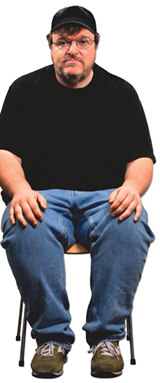
Michael
Moore
Photo courtesy: The Weinstein
Company
|
Does the film give an
accurate picture of Canada's healthcare?
David Gratzer:
Not in the least. Consider
Moore's claim that ERs don't overcrowd in Canada. A
Canadian government study recently found that one in
10 patients waits more than a dozen hours for care.
Michael
McBane: A lot of that is anecdotal — he
happened to run into people who were not waiting long.
But it's not a film about wait times.
Jacques
Chaoulli: He should also have interviewed patients
and relatives of those who have died as a result of
the waiting lists.
Danielle
Martin: The two basic messages about Canadian
healthcare in the movie remain true: first, insurance
companies do not interfere with our clinical practice
here as physicians. Second, access to care here is based
on clinical need, not ability to pay.
John
Oberlander: I also think it's important to understand
this in an American context: we hear almost nothing
about other nations' health systems, and when we do
it is often exaggerated claims about how bad they are
— claims promoted by our own insurance industry.
What can Canadians learn from
SiCKO?
Michael McBane:
SiCKO's a wake-up call for Canadians to get real
about how private healthcare works. The notion that
the private sector is the solution to our wait times
is totally blown out of the water in the film.
David
Gratzer: Unfortunately, Moore's analysis is so
superficial that I don't think Canadians can learn much
of substance. As a country lawyer once wrote, people
who like this sort of thing will like this sort of thing.
Adalsteinn
Brown: I think SiCKO will be a non-event
here.
|
Meet NRM's expert panellists
Adalsteinn
Brown, PhD, Ontario's
Assistant Deputy Minister for Health System Strategy
Jacques
Chaoulli, MD, successfully
sued Quebec government to legalize private health
insurance
David
Gratzer, MD, Toronto
psychiatrist, fellow at conservative think tank
Manhattan Institute and author of The Cure:
How Capitalism Can Save American Health Care
Danielle
Martin, MD, president,
Canadian Doctors for Medicare
Michael
McBane, national
coordinator of the Canadian Health Coalition
Jonathan
B Oberlander, PhD,
US political scientist and author of The Political
Life of Medicare
|
What was the most powerful message
of the film for you?
Jon Oberlander:
That the American healthcare system is broken. What
can we say of a health system that forces people to
choose which finger to get reattached because they don't
have health insurance? Or a hospital that dumps homeless
patients onto skid row?
Danielle
Martin: I think the film has helped Americans
begin to understand that while private markets work
in most parts of life, in healthcare they do not lead
to improved access.
Jacques
Chaoulli: The lack of morality of some private
insurance companies in the United States. In my view,
that refers to the need of independent watchdogs acting
as health advocates on behalf of consumers, like the
organization I am in the process of establishing in
Quebec, the Chaoulli Group.
Michael
McBane: To maximize profits and to care are irreconcilable
purposes. You can't do both. That's what we see emerging
with Jacques Chaoulli and Brian Day — physicians
and owners of for profit facilities, are they putting
profits first or patients first? Traditionally, arms
dealers are not Ministers of Defence.
David
Gratzer: That government-run healthcare is beautiful
and compassionate.
And the film's most dubious
claim...?
David Gratzer:
That government-run healthcare is beautiful and compassionate!
Jacques
Chaoulli: That other countries provide "free"
healthcare. That's not true. There is no free healthcare.
It is paid for through public or private insurance.
Jon
Oberlander: The implicit claim that everything
is perfect in Britain, France and Canada is obviously
inaccurate.
Danielle
Martin: The Cuban segment of the film was interesting,
but likely fairly inflammatory to American audiences.
| Roundtable
soundbites |
"The notion
that the private sector is the solution to
our wait times is totally blown out of the
water in the film"
— Michael McBane |
 |
|
"Michael Moore should
also have interviewed relatives of those
who have died as a result of the waiting
lists"
— Dr Jacques Chaoulli
|
 |
|
"We cannot risk a system
where some people can benefit and others
cannot"
— Adalsteinn Brown
|
 |
|
"All healthcare systems
have problems but the US is unique in its
inequity and failure to secure universal
coverage for its population"
— Jon Oberlander
|
 |
|
"While the system we
work in is far from perfect, Moore accurately
depicts the dangers of the alternative"
— Dr Danielle Martin
|
 |
|
"Unfortunately, Mr
Moore's analysis is so superficial that
I don't think Canadians can learn much of
substance"
— Dr David Gratzer
|
 |
|
For those of you who are physicians,
how did you feel watching your American colleagues who
served as medical directors for insurance companies
admit their job is primarily to deny care?
Jacques Chaoulli:
I was very shocked. It's a shame.
Danielle
Martin: Any healthcare system that functions
with the goal of denying medically necessary care to
patients should serve as a cautionary tale to all physicians
whose first obligation is to do no harm.
David
Gratzer: I'm not sure our approach here in Canada
has been so tremendously different. From new drug approvals
to investments in cutting-edge technology, bureaucrats
are making decisions for patients — but with an
eye on the budget line.
Isn't it rather odd that as
Americans are looking at creating a universal healthcare
system, many Canadians are talking about increased private
delivery?
Jon Oberlander:
That's oversimplified. Canadians aren't privatizing
their system, they are debating where the boundary should
be between public and private and whether private clinics
and so forth should have an expanded role. And Americans
are talking about universal coverage, but don't hold
your breath—we have been debating this for nearly
a century.
Michael
McBane: A small number of ideologues are trying
to Americanize our healthcare. What Chaoulli is proposing
is the emergence of a two-tier system, a way for the
rich to jump the line. But 80% of Canadians believe
in our system.
Adalsteinn
Brown: With tens of millions of uninsured and
under-insured citizens, the US healthcare system is
a wedge between the haves and the have-nots and it can
create a risk to a sense of national solidarity. We
cannot risk a system where some people can benefit and
others cannot.
In the US, physicians are not
exactly clamouring for universal healthcare. Canadian
doctors opposed medicare when it began. Do doctors care
more about their pocketbooks than their patients?
Jon Oberlander:
In the US that statement is certainly true historically
of organized medicine (ie, the American Medical Association).
However, it's self evidently not true of many individual
physicians.
David
Gratzer: Governor Schwarzenegger is running into
problems [with his univsersal healthcare proposal for
California]. He's proposing a host of "fees," the largest
would be on the gross revenue of physicians. Needless
to say, while many docs support his overall efforts,
they aren't thrilled about this fee.
Jacques
Chaoulli: Most doctors feel, rightly, that the
quality of care requires a basic freedom of relationship
between them and their patients. That freedom is profoundly
lacking in many countries, due to the excessive government
interference. Few doctors are greedy, like in any section
of the society.
Michael
McBane: We've seen US physicians testify to Congress
that they've killed patients on behalf of insurance
companies. That could happen in Montreal just as easily
as LA.
If someone were to make a Canadian
version of SiCKO, about the horrors of Canadian
healthcare, who would you suggest for the job? George
Stroumboulopoulos? Rick Mercer? Sacha Trudeau?
Michael McBane:
Rick Mercer certainly has the satire skills to pull
it off.
|
What did you think
of the movie? Send us your thoughts at [email protected]
or by fax at 514-397-0228. We'll publish selected
comments in our next issue.
|
David
Gratzer: How about Jacques Chaoulli?
Jacques
Chaoulli: I would suggest myself — should
money be there for the financing of it.
Danielle
Martin: Judging by the Canadian vote for Tommy
Douglas as the "Greatest Canadian" in the CBC's competition,
I think it would be pretty difficult to find a high-profile
and well-respected Canadian who would want to make a
movie slamming medicare.
Jon
Oberlander: Okay, you've lost me here!
Questions by Sam Solomon
|